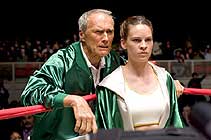|
|
|
|
Million Dollar Baby
|
 |
|
When
Clint Eastwood – among the most significant and impressive directors in
contemporary American cinema – made, at the age of 62, his masterpiece Unforgiven in 1992, it already felt like a final, summing-up,
testament work. And that testament was a little hard on the career of an
artist-entertainer who had no intention of giving up in a hurry. Although
Eastwood has gone on to make some wonderful films (including A Perfect World [1993] and Space Cowboys [2000]) in between some
alarmingly clunky ones (such as Midnight in the Garden of Good and Evil, 1997),
they have all felt like postscripts, twilight works that refer to and vary what
was perfected in Unforgiven.
Million Dollar Baby, too, goes back over the
familiar elements of Eastwood’s dramas. But, miraculously, this time he has
managed to produce not only another testament, but also another masterpiece. It
is a superbly crafted film that brings together everything Eastwood is best at
as a director and storyteller, while minimising the nagging problem areas of
his work.
Million Dollar Baby has been described
everywhere as a boxing film, but the label is misleading and even unhelpful.
Yes, it is true that one can learn much more from Eastwood’s movie about the
technicalities of this strange, bloody sport – the footwork, the punching
styles, the physical injuries – than from the abstract, stylised, decentred
narrative of Martin Scorsese’s Raging Bull (1980). But Eastwood is not much
interested in exploring or questioning the issue of violence, and even less in
the typical boxing-film theme of masculine identity.
This
film observes the world of boxing dispassionately, taking no moral stance. It
is much closer to the melancholic portrait painted by John Huston in his
classic Fat City (1972) than to the
punch-drunk hungry heroes and social allegories served up by John Garfield
films in the 1940s, or by Sylvester Stallone in his Rocky series.
The
modest gym run by Frankie (Eastwood) collects losers of various kinds. And one
woman, not so young, who yearns for a chance in the ring: Maggie (Hilary
Swank). Frankie’s laconic right hand man, Scrap (Morgan Freeman), an ex-boxer
who is also the film’s wise and hard-boiled narrator, expresses well the hope
of Maggie and all who hang around this gym: they are all aiming for dignity,
for a chance to make something of themselves in the eyes of the world. Most
will not make it, but Maggie indeed has the potential to become the ‘million
dollar baby’.
Objectors
to this film have rankled at its unbridled, possibly all-American code of
individualism, and its distaste for explanations based on the supposed ‘victim
mentality’ of social determinism – a distaste topped only by the ferocity with
which Eastwood and gifted screenwriter Paul Haggis depict Maggie’s grasping,
unlovely family members. These aspects certainly count as minor flaws in an
otherwise perfect work.
But
Eastwood’s head and heart are fundamentally elsewhere. He is attracted to the
vexing ambiguities of behaviour, and especially to the complexities of
emotional bonding – what it means to commit yourself to someone, how you choose
that person, and what role you cast them in (friend, lover, mentor, student,
parent, child). Although Eastwood is not beyond
leaning on the sentimentality and pathos he has (expertly) milked before in
films like Honkytonk Man (1982), here
he goes deeper into the Frankie-Maggie bond than his stories usually allow.
Jacques
Rivette once remarked that every good film should be seen twice: the first time
for surprise, the second time for ravishment. That is an apt motto for Million Dollar Baby, about which it is
preferable to know almost nothing before you see it for the first time. And
this is not merely a matter of a certain, crucial development that changes and
deepens the course of the plot.
Eastwood
– who, fittingly, became a star because of immortal, quotable lines like ‘make
my day’ and ‘read my lips’ – builds, again and again, to a clincher utterance
by one of his characters, something that suddenly brings to the surface and
encapsulates, poignantly or ironically, everything brewing in the netherworld
of this movie. Such moments, so powerful and soulful, are the proof of
Eastwood’s greatness as a filmmaker.
Not
one of these lines should be spoilt for any prospective viewer of Million Dollar Baby. Suffice it to say
that, by the time you hear Scrap reflect on the ‘kind of man’ Frankie is, you
will have reached the heart of the Great Eastwood Mystery – the way in which
his films can simultaneously celebrate triumph and plumb an abyss of loss.
MORE Eastwood: Absolute Power, The Bridges of Madison County, Blood Work, Pale Rider, Mystic River, The Mule © Adrian Martin February 2005 |
![]()